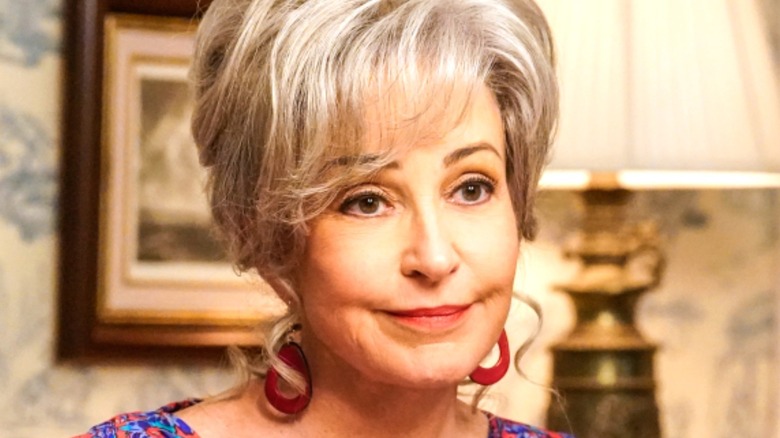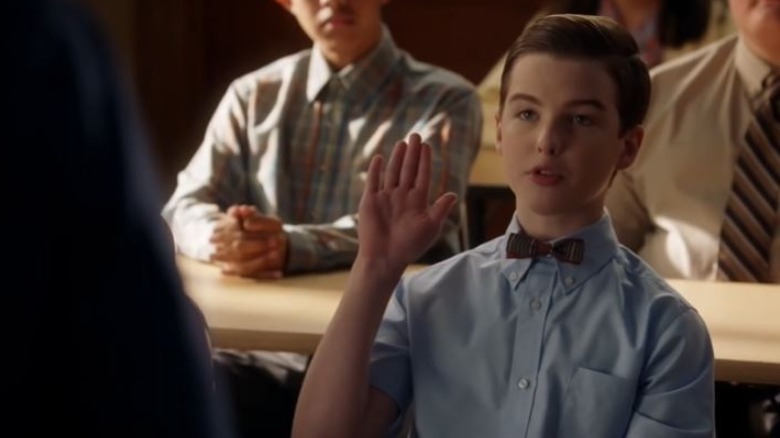Why Young Sheldon's Creator Thinks You Should Stop Comparing It To The Big Bang Theory
It's been three years since "The Big Bang Theory" went off the air, and fans still can't stop comparing it to the CBS sitcom's prequel series, "Young Sheldon" — with viewers often nitpicking and finding plot holes throughout. Well, co-creator Steven Molaro has a message for those people.
"I'm happy to point out that on 'Cheers,' Frasier was an only child, and it all worked out once Niles suddenly appeared," zinged Molaro, while speaking to TV Line about the ongoing fifth season of "Young Sheldon."
Since debuting in 2017, the Chuck Lorre and Molaro-led spinoff has offered up countless new stories and tales centered around young Sheldon Cooper (Ian Armitage), and oftentimes, these experiences will contradict with what happened or was said about the character's life on "The Big Bang Theory." For example, there's been scenes in "Young Sheldon" where Armitage's Cooper shakes hands with people without wearing gloves, something adult Sheldon (Jim Parsons) never does — not even with family (via Daily Express). Then there's the negative portrayal of Sheldon's father, George Cooper Sr., in "The Big Bang Theory" but not in "Young Sheldon." Instead, fans are treated to a much softer and kinder depiction of George Sr., as pointed out by CheatSheet.
Overall, "Young Sheldon" has been a hit for CBS, which has renewed it for two more seasons, with more expected to follow (via Variety). But if viewers are going to continue enjoying Lorre and Molaro's storytelling, they're going to have to be more open to leaving "Big Bang" in the past — because here's what else Molaro had to say about the matter.
Young Sheldon creators don't want to be 'handcuffed' to Big Bang Theory
According to Steven Molaro, the "Young Sheldon" creative team doesn't want the show to be tied down by any concrete plans or storylines related to adult Sheldon in "The Big Bang Theory." While, of course, there will be things they try to keep consistent about the respective timelines and characters throughout each season, they ultimately have to keep their focus on the series they are working on, rather than what came in the past.
"We don't have a precise roadmap in front of us — and to some extent, we don't feel handcuffed to things that were said on Big Bang," Molaro explained to TV Line. "I mean, there are some things that we will honor, but we also have to do what's best for this series."
As pointed out by TV Line's Ryan Schwartz during his interview with Molaro, "Young Sheldon" has always been a series that prides itself in finding "workarounds" to prior angles and stories from "Big Bang." And this is something that the showrunners have recognized and homed in on over the years, by playing on the way that Sheldon's past interpretations of events in "The Big Bang Theory" might be different from how interprets them both in the past — and in the future, as he gets older. "That has become, to me, a big part of what this series is about," Molaro said. "You have Sheldon, who is the narrator some years in the future and finds himself at an age beyond his own father, [a man] he didn't understand when he was a kid. It's a bit of a revelation. Maybe the things he thought about his parents, in particular his dad, were not quite accurate and he needs to rethink them, and that is one of the things holding this whole series up."

